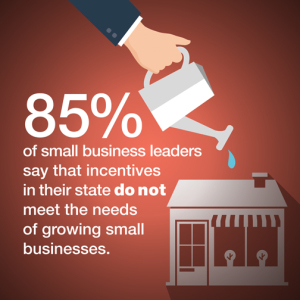 A national survey of 41 leaders of small business organizations representing 24,000 member businesses in 25 states reveals that they overwhelmingly believe that state economic development incentives favor big businesses, that states are overspending on large individual deals, and that state incentive programs are not effectively meeting the needs of small businesses seeking to grow.
A national survey of 41 leaders of small business organizations representing 24,000 member businesses in 25 states reveals that they overwhelmingly believe that state economic development incentives favor big businesses, that states are overspending on large individual deals, and that state incentive programs are not effectively meeting the needs of small businesses seeking to grow.
A large majority also say small businesses interests in economic development are not well represented in their state capitols. The credit crunch is a critical problem, and many also emphasize that public goods that benefit all employers-such as job training, education, and transportation-deserve to be a higher priority.
The study was funded by the Ewing Marion Kauffman Foundation. It is available on the Good Jobs First website at http://www.goodjobsfirst.
“Our findings are absolutely consistent with what we have heard for years from small business leaders,” said Good Jobs First executive director Greg LeRoy. “Despite their pro-small business rhetoric, state officials’ programs are perceived as biased in favor of large companies that receive big tax-break packages.”
Specifically:
- 92 percent believe that the spending balance on incentives between small and large businesses in their state is biased toward big businesses (69 percent strongly believe).
- 79 percent believe that their state is overspending on big incentive deals, hurting state finances (56 percent strongly).
- 87 percent say that small business interests in economic development issues are not effectively represented in their state’s capital (36 percent strongly).
- 85 percent believe that economic development incentives in their state are not effectively addressing the current needs of small businesses that are seeking to grow (36 percent strongly).
- 72 percent do not believe their state’s current incentive policies are effective in promoting economic growth (23 percent strongly).
The respondents lead groups from 25 states, including all but one of the 15 most-populous. They belong to networks formed in the past 15 years, many with economic development missions. None is contracted by state or local governments to perform economic development functions such as outside-firm recruitment.
“Our next study will examine in great detail how well or poorly state incentive programs treat small, local and/or entrepreneurial businesses versus large, multistate companies” added LeRoy.
Good Jobs First is a non-profit, non-partisan resource center on economic development. Founded in 1998, it is based in Washington DC.




